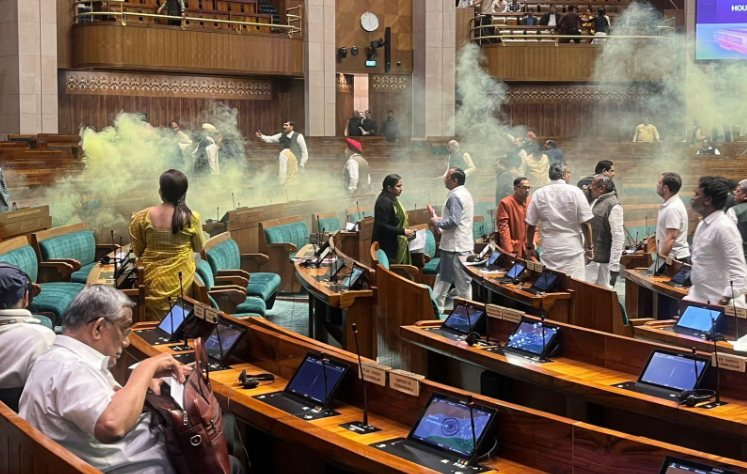
India's Parliament, the majestic temple of democracy, has been marred by security breaches twice. The first, a brutal terrorist attack in 2001, left the nation scarred. The second, a security lapse in December 2023, sparked outrage and highlighted persistent vulnerabilities. On the anniversary of the 2001 attack, December 13th, 2023, a different kind of security breach unfolded. During Zero Hour in the Lok Sabha, two individuals, Sagar Sharma and Manoranjan D., jumped from the visitors' gallery into the chamber, releasing yellow smoke canisters and shouting slogans. Though not violent, the act exposed significant security lapses. Simultaneously, outside the Parliament premises, two others, Amol Shinde and Neelam Devi, were apprehended for using coloured gas canisters and raising slogans "Tana shahi nahi chalegi" (dictatorship will not be tolerated). Investigations revealed the group might have been inspired by Bhagat Singh's act of throwing bombs in the Central Assembly in 1929. However, unlike Singh's act of protest against British rule, there was no violence here. Police investigations revealed that the protestors, connected through a social media page called "Bhagat Singh Fan Club," planned the act for months. They shared a common purpose – to draw attention to various issues plaguing the nation, from farmer grievances to the situation in Manipur. However, their methods raised questions about the line between peaceful protest and a security breach. The incident sparked outrage across the country. The Lok Sabha resumed after a brief disruption, with Speaker Om Birla ordering an investigation. The focus shifted to the negligence in security protocols that allowed the canisters to be smuggled in. The incident sparked a debate about the effectiveness of existing security measures and the need for stringent enforcement. Now, the question arises: How can India achieve a balance between strengthening its security in the wake of the Parliament's intrusion and upholding the imperatives of safeguarding individual freedoms and principles of democratic expression? Security breaches sparked renewed debate on balancing robust security with fundamental rights and democratic expression. This complex issue demands a nuanced approach. On the one hand, strong security measures are essential to safeguard Parliament, the cornerstone of Indian democracy. A successful attack here could weaken the nation's democratic processes. Public confidence also hinges on a solid security posture. On the other hand, a healthy democracy allows for peaceful dissent. Strict security measures shouldn't be a cloak for stifling legitimate dissent. Transparency and clear guidelines are crucial to ensure security checks aren't misused. Finding the middle ground involves targeted security measures, not blanket restrictions. Utilising advanced screening technology alongside well-trained personnel can improve detection without infringing on individual rights. Open dialogue with civil society groups can build trust in security practices. Streamlining legislative processes and addressing public concerns about inefficiency can lessen the urge for disruptive protests. India's challenge is to create a Parliament that is secure from violence while remaining a space for open discourse. The main reason the individuals entered the Parliament was to seek the attention of the Prime Minister on issues like employment, as they considered it their last resort. This calls for a multi-pronged approach that balances security concerns with democratic values. Addressing concerns about national security laws that might infringe on individual rights and preventing the misuse of security measures to silence dissent are additional hurdles to overcome. India's journey towards a secure and inclusive Parliament is a continuous process that requires fostering open dialogue, implementing targeted security measures, and upholding democratic principles. In the aftermath of the 2023 breach, a committee under Anish Dayal Singh, Director General of the Central Reserve Police Force, was formed to study the lapses and suggest corrective measures. The party in power also faces criticism for blaming opposition parties instead of conducting a thorough internal investigation. The outrage over negligence takes us back to 13 December 2001, a day carved in India’s blood. A suicide squad of five terrorists affiliated with Jaish-e-Mohammed and Lashkar-e-Taiba infiltrated the Parliament complex in a white Ambassador car. Its red light and a Parliament access sticker deceived security. However, a collision with Vice President Krishan Kant's convoy hindered their direct access to the main building. Undeterred, the terrorists opened fire. Parliament House security officer J.P. Yadav raised the alarm with his final act of bravery before being killed. Constable Kamlesh Kumari and gardener Desh Raj also fell victim to the initial onslaught. The remaining terrorists, armed with Kalashnikovs and grenades, scaled a wall and raced towards the entrance used by the Prime Minister. Meanwhile, Parliament had been alerted, and doors were slammed shut. The ensuing gunfight resonated through the halls. Three terrorists were killed near gates 8 and 9. Another attempted to climb the building using a Doordarshan cable but was shot and fell. The remaining terrorist, to inflict maximum damage, detonated his suicide vest near the main entrance, sending shockwaves through the nation. The attack, though thwarted by a combination of bravery and fortuitous circumstances, claimed the lives of six security personnel and a gardener. It served as a stark reminder of the ever-present threat of terrorism and the need for robust security measures. A call to action beyond band-aid solutions is required, which calls for a multi-pronged approach. Upgrading security infrastructure, including stricter visitor protocols, is crucial. Public discourse channels and transparent investigations are needed to address discontent and restore trust. Regular security audits and personnel training are essential. Building a more inclusive Parliament requires community engagement and streamlining legislative processes.
Image Caption: Naidunia
01 Jun 2024
Parul Jaiswal